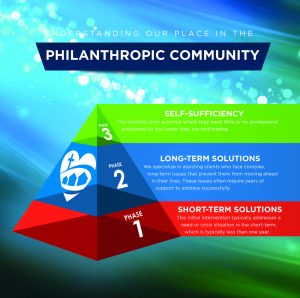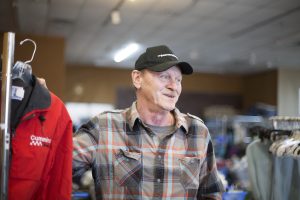September 22, 2017 // Diocese
Catholic Charities’ place in the philanthropic community
Providing local, Catholic solutions to complex human problems
Editor’s Note: This is the third in a series of articles about Catholic Charities in the Diocese of Fort Wayne-South Bend and its role as the social-service arm of the Catholic Church.
Many ask, what sets Catholic Charities apart from other philanthropic organizations in our community? This is the question addressed in this series.
First, it is important to know that Catholic Charities is guided by Catholic social teaching, which instructs it to view those it serves in their full humanity — that is, as people who have both great needs and great potential. As a result, Catholic Charities strives to be a model of God’s love and mercy, offering true compassion to those in need while empowering them physically, mentally, emotionally and spiritually to live as full a life as their capabilities will allow.
Many Catholic Charities clients are facing some short-term crisis in meeting basic needs, such as adequate food, clothing or shelter. The organization refers to this initial intervention as a Phase 1 Service (see the Service Pyramid), which typically last less than one year.

The Catholic Charities Service Pyramid consists of three phases. Phase 1 — Short-Term Solutions; this initial intervention typically addresses a need or crisis situation, which typically lasts less than one year. In Phase 2 — Long-Term Solutions, Catholic Charities specializes in assisting clients who face complex, long-term issues that prevent them from moving ahead in their lives. In Phase 3 — Self-Sufficiency, the client(s) enter a period in which they need little or no professional assistance for the issues they are confronting.
However, the real focus of its work is why someone comes to Catholic Charities under such circumstances. Those unmet basic needs are often symptomatic of more complex, long-term issues that prevent them from moving ahead in their lives. These secondary interventions are described as Phase 2 Services, which often require years of professional support to address successfully.
Failure to confront long-term issues can have dire social and personal consequences. Consider one of the organization’s local clients, Earl Meeks. (See his story nearby.) He had checked himself into the Rescue Mission to get sober. Often, though, without job placement and job coaching, people like Meeks flounder and remain unemployable.
Fortunately for Meeks, Catholic Charities offers SCSEP for job placement and related support services. SCSEP stands for Senior Community Service Employment Program and it’s the nation’s longest-running program to help low-income, unemployed individuals, aged 55 and over, to find work.
Funded by a Catholic-friendly grant from the U.S. Department of Labor and operated in cooperation with Senior Service America Inc., SCSEP subsidizes employment for low-income seniors through jobs — up to 20 hours a week at minimum wage — with nonprofit organizations and governmental entities. (Please note that grants, direct or indirect, are only accepted by Catholic Charities if, and only if, they do not require the organization to in any way to compromise Catholic beliefs.)
Participants are able to gain valuable work experience and have the opportunity to learn new skills. The goal of the program is for the men and women who participate to gain permanent, unsubsidized employment that helps them maintain their independence.
SCSEP is a Phase 2 service, providing long-term support for older clients who need assistance returning to the work force. In 2016, Catholic Charities assisted 115 SCSEP clients, while to date 313 employers have hired SCSEP participants.
So many of the vulnerable in local communities are forgotten after the food and clothing are dispensed. It is Catholic Charities’ mission to address the long-term issues they face, however, so they can live up to their God-given potential. This is one more way Catholic Charities strengthens families and alleviates poverty.
Earl’s Story

Earl Meeks is a participant in the Catholic Charities SCSEP program, which helps seniors 55 and older find employment.
“I’ve had it. I can’t do this anymore.”
Those were Earl Meeks’ words to his daughter the night he decided to quit drinking.
For years, Meeks had been a functional alcoholic. He would work during the day and drink at night. Then came two great traumas that would plunge him deeper into his alcoholism — the loss of his brother-in-law and his beloved wife.
“Those [events] put me in a very dark place,” he said. “And drinking only made it worse.”
Originally from a small town in Tennessee, Meeks had lived for 29 years in Bluffton, where he was a factory worker. Then, when he hit bottom in 2014, he checked himself in at the Fort Wayne Rescue Mission, where he was determined to beat his addiction. There he took refuge in Christ and the companionship of fellow recovering alcoholics.
Removing himself completely from his home and a circle of friends was a godsend. The structure and support of the Rescue Mission took his life in a new direction. Meeks’ emersion in the Bible seven days a week, along with the company and encouragement of fellow Christians, set him on the course to sobriety.
After making considerable progress, his case manager at the Rescue Mission decided he would be the perfect candidate for the Catholic Charities Senior Community Service Employment Program.
SCSEP is the nation’s longest-running program to help low-income, unemployed individuals, aged 55 and over, find work. Participants receive instruction on healthy aging and job training opportunities that provide no-cost staff assistance to local nonprofit, government and faith-based agencies. The ultimate goal of SCSEP is for participants to find employment.
“We often receive referrals from agencies such as the Rescue Mission,” said SCSEP program manager Jennifer Zamaites. “SCSEP is perfect for people like Earl, who are transforming their lives. Employment often plays a major part in their success.”
Jennifer first assessed Meeks’ situation and then, based on his personal needs and employment interests, helped him in creating an Individual Employment Plan so he could achieve his goals. The SCSEP team searched their list of host agencies and then last July placed him at Treasure House, a secondhand store run by the Rescue Mission. Meeks works in the warehouse, assisting the staff with newly donated items. And thanks to SCSEP he is also living in his own apartment, arranged through the Fort Wayne Housing Authority.
“I have witnessed an amazing change in Earl,” said Zamaites. “He has become more self-confident and can view the road ahead with hope. He displays an unwavering commitment to living a fulfilling and healthy life.”
SCSEP has and will continue to offer ongoing support for Meeks through resource and referral services, job coaching, job clubs and job readiness activities such as resume updating, mock interviews and job search assistance.
Meeks’ future is looking up. When he is not working, he volunteers at the Rescue Mission, helping others like himself. He also attends church regularly and hopes to graduate from his GED program this spring.
“I can never repay what I owe these people,” said Meeks, reflecting on the assistance he has received from Rescue Mission and SCSEP. “They have been such a tremendous blessing to me.”
The best news. Delivered to your inbox.
Subscribe to our mailing list today.






